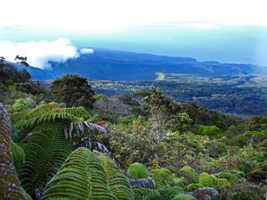DLNR Program Aims to Protect Hawai‘i Watershed Forests
By Maui Now Staff
The Hawai‘i Department of Land and Natural Resources has received over $467,000 as part of a new nationwide program aimed at protecting forest reserves. The Regional Conservation Partnership Program focuses on partnerships to enable commercial businesses, land owners, local communities, and other non-government partners in keeping lands healthy, water clean, and economies growing in a variety of industries.
“Our forests ensure fresh, clean water because they act like sponges, absorbing mist and rain,” said DLNR Acting Chairperson Carty Chang. “Hawai‘i’s rainfall and water supplies have been steadily declining, a trend expected to accelerate due to climate change. We must act now to protect forests to ensure water for people today and future generations.”
“Hawai‘i forests span both private and public lands,” Chang said. “Regardless of their location, they provide benefits for all. In addition to providing water, forests control erosion and flooding, and are habitat for plants and wildlife found nowhere else in the world. With forests providing so many benefits, many partners have come forward to support their protection. We are grateful to the USDA for joining us in recognizing this as a priority for Hawai‘i.”
Video of The Nature Conservancy’s Waikamoi Preserve on Maui highlights the type of forest this grant seeks to protect: www.vimeo.com/116724944.
RCPP projects have been award in all 50 states across the US.
“This project, the first funded under RCPP in Hawai‘i, is part of a larger effort to protect our forests under DLNR’s Watershed Initiative,” said Craig Derickson, acting director for the USDA’s Natural Resources Conservation Service Pacific Islands Area. “The goal is to provide long-lasting conservation benefits by implementing practices to control invasive species, exclude non-native hooved animals (ungulates), and plant native tree species on forest lands over the next several years through our partnership.”











